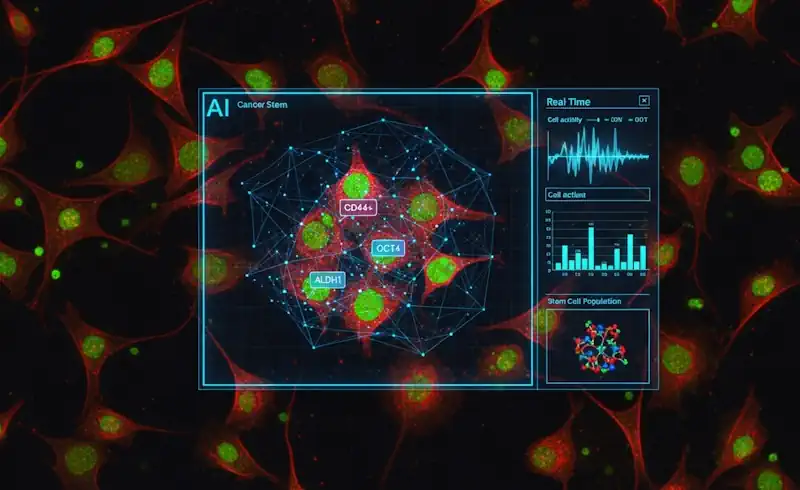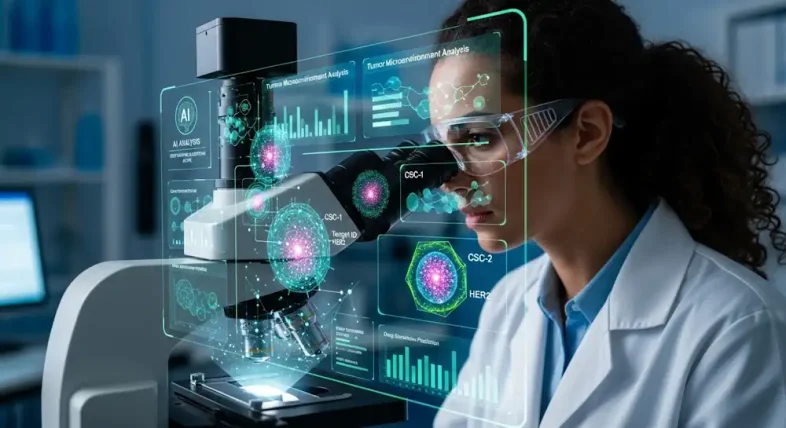Artificial intelligence may soon help researchers tackle one of the most persistent barriers in oncology – the resilience of cancer stem cells. Scientists at the University of California San Diego have created an AI-powered platform that identifies compounds capable of reprogramming and destroying these stubborn cells. The discovery could mark a major step toward therapies that not only shrink tumors but also prevent relapse and drug resistance.
Understanding Cancer Stem Cells
Cancer stem cells represent a small fraction of cells within a tumor, but they are believed to play a decisive role in whether cancer returns after treatment. These cells possess stem-like properties, allowing them to self-renew and generate new tumor growth even after chemotherapy or radiation has killed the bulk of the cancer. Their persistence often leads to treatment failure, metastasis, and aggressive recurrence.
Traditional cancer drugs are typically designed to target rapidly dividing cells. While effective against much of the tumor, these therapies often leave stem-like cells untouched. Over time, these cells can rebuild the cancer, leading to renewed disease progression. For researchers, the challenge has been to find ways to either eliminate these cells or permanently change their behavior.
AI System Identifies Promising Drug Candidates
The UC San Diego team approached this challenge using artificial intelligence. They trained their system on extensive molecular and genetic datasets to uncover the complex networks that regulate stemness – the traits that make cancer cells capable of renewal. By simulating how different compounds interact with these pathways, the AI was able to predict which molecules might suppress stem cell characteristics without damaging healthy tissue.
From thousands of possibilities, the system highlighted a short list of drug candidates that could potentially “reprogram” cancer stem cells. Laboratory testing confirmed that some of these compounds altered key genetic signatures linked to tumor regeneration. In experiments, treated cancer stem cells lost their ability to form new tumors and began behaving more like normal cells.
Combining Machine Learning and Molecular Biology
Researchers emphasized that the strength of the project lies in its integration of computational modeling and laboratory science. The AI platform does not simply guess at drug behavior — it learns from experimental data and refines its predictions over time. As a result, the system continuously improves, identifying more precise targets for intervention with each round of analysis.
This iterative design mirrors how AI has transformed other fields, such as drug design and protein folding prediction. By accelerating hypothesis generation and reducing costly trial-and-error experiments, machine learning can drastically shorten the path from discovery to clinical application.
Potential to Reduce Treatment Resistance
Treatment resistance remains a central problem in modern oncology. Many advanced cancers develop mutations that render standard therapies less effective. Because cancer stem cells are genetically flexible and highly adaptive, they often survive even the most aggressive treatment regimens.
By reprogramming these cells rather than destroying them, scientists hope to undermine their capacity for resistance. Early data suggest that this reprogramming approach could make existing drugs more effective and extend remission periods. It could also lower the risk of recurrence, a crucial benefit for patients with cancers that tend to relapse, such as breast, colon, and pancreatic cancers.

Next Steps in Translational Research
The UC San Diego group plans to test the most promising drug candidates in animal models before advancing to human clinical trials. Parallel studies are underway to adapt the AI system for different tumor types, with a goal of creating a cross-platform tool that can identify treatments for multiple cancers.
Researchers also envision integrating the platform into collaborative cancer databases, allowing hospitals and pharmaceutical companies to share molecular data. Such integration could lead to real-time discovery pipelines that update as new patient samples and genetic information become available.
A Glimpse Into the Future of Oncology
The study highlights a broader transformation in cancer research. Artificial intelligence is increasingly being used not only to identify new drug targets but also to model disease progression, predict treatment responses, and personalize therapy. Instead of relying solely on laboratory screening, scientists can now use data-driven simulations to anticipate which treatments will work best for specific patient populations.
While clinical validation is still needed, experts say the use of AI to reprogram cancer stem cells could represent a shift from reactive to preventive oncology – one focused on stopping recurrence before it starts. If successful, this approach could reduce treatment intensity, lower side effects, and significantly improve long-term survival rates.
As one of the study’s lead investigators noted in related reports, the ultimate goal is to “teach cancer cells to forget how to be cancer”. The idea may once have sounded like science fiction, but with artificial intelligence guiding the process, it is rapidly becoming a realistic aim in the next generation of cancer therapy.

